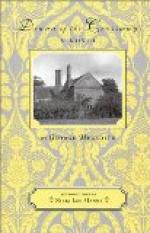But others of the sons and daughters of London were regretting her prolonged absence. The great and exclusive Whitmonby, who had dined once at Lady Wathin’s table, and vowed never more to repeat that offence to his patience, lamented bitterly to Henry Wilmers that the sole woman worthy of sitting at a little Sunday evening dinner with the cream of the choicest men of the time was away wasting herself in that insane modern chase of the picturesque! He called her a perverted Celimene.
Redworth had less to regret than the rest of her male friends, as he was receiving at intervals pleasant descriptive letters, besides manuscript sheets of Antonia’s new piece of composition, to correct the proofs for the press, and he read them critically, he thought. He read them with a watchful eye to guard them from the critics. Antonia, whatever her faults as a writer, was not one of the order whose Muse is the Public Taste. She did at least draw her inspiration from herself, and there was much to be feared in her work, if a sale was the object. Otherwise Redworth’s highly critical perusal led him flatly to admire. This was like her, and that was like her, and here and there a phrase gave him the very play of her mouth, the flash of her eyes. Could he possibly wish, or bear, to, have anything altered? But she had reason to desire an extended sale of the work. Her aim, in the teeth of her independent style, was at the means of independence—a feminine method of attempting to conciliate contraries; and after despatching the last sheets to the printer, he meditated upon the several ways which might serve to, assist her; the main way running thus in his mind:—We have a work of genius. Genius is good for the public. What is good for the public should be recommended by the critics. It should be. How then to come at them to, get it done? As he was not a member of the honourable literary craft, and regarded its arcana altogether externally, it may be confessed of him that he deemed the Incorruptible corruptible;—not, of course, with filthy coin slid into sticky palms. Critics are human, and exceedingly, beyond the common lot, when touched; and they are excited by mysterious hints of loftiness in authorship; by rumours of veiled loveliness; whispers, of a general anticipation; and also Editors can jog them. Redworth was rising to be a Railway King of a period soon to glitter with rails, iron in the concrete, golden in the visionary. He had already his Court, much against his will. The powerful magnetic attractions of those who can help the world to fortune, was exercised by him in spite of his disgust of sycophants. He dropped words to right and left of a coming work by Antonia. And who was Antonia?—Ah! there hung the riddle.—An exalted personage?—So much so that he dared not name her even in confidence to ladies; he named the publishers. To men he said he was at liberty to speak of her only as the most beautiful woman of her time. His courtiers of both sexes were recommended to read the new story, the princess Egeria.




